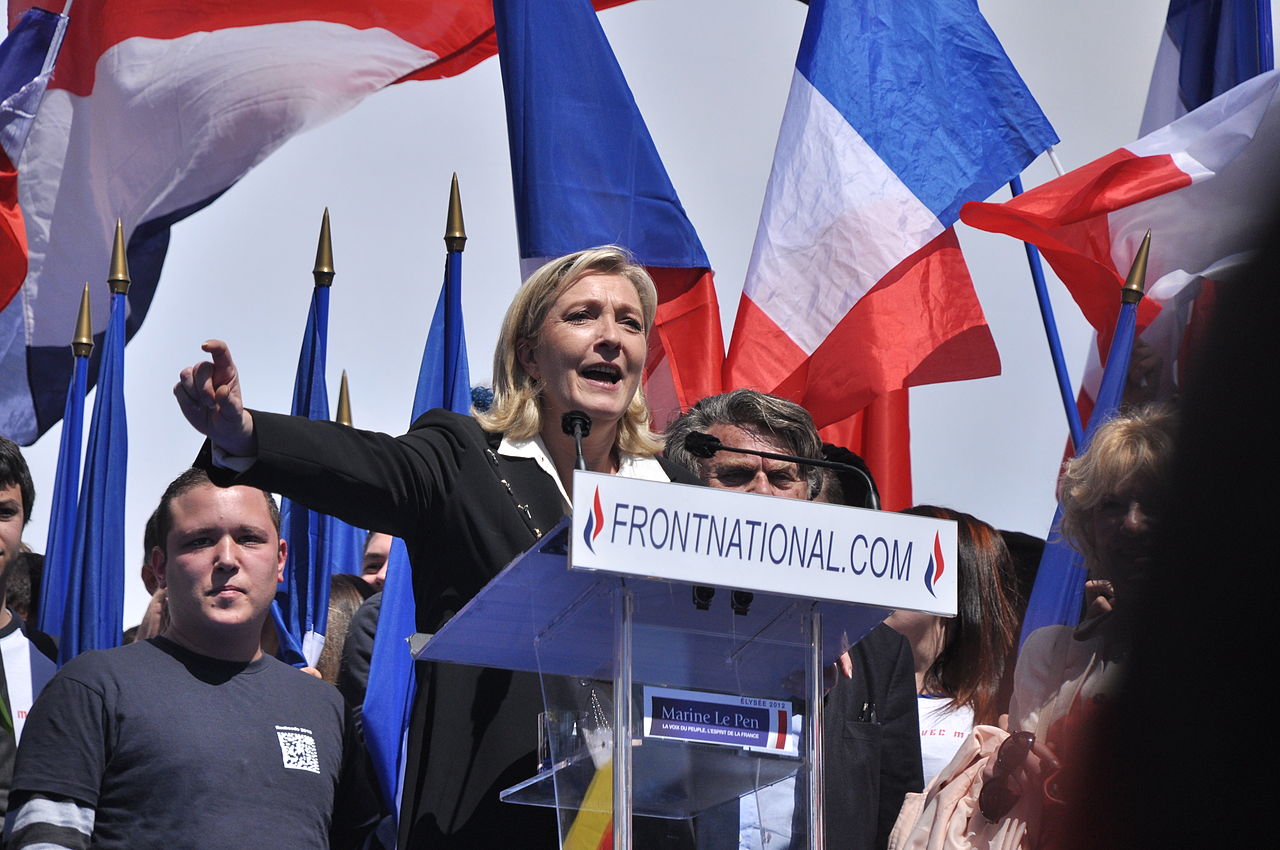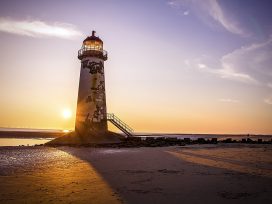Historian Enzo Traverso has stated that ‘to seek for Filippo Tommaso Marinetti, Erns Jünger and Carl Schmitt – aesthetes of violence and theorists of the total state – in today’s Europe would be as anachronistic and futile as lamenting the absence of a philosopher of communicative action like Jürgen Habermas, or the lack of a justice theorist such as John Rawls, in 1922 Italy, or in 1933 Germany.’ Each age produces its own kind of idiosyncratic philosopher. The dialogues and the correspondences of antiquity don’t resemble the treatise and summae of the Middle Ages, and these don’t resemble either the discourses and essays of modernity; our age in its turn seems to favour those philosophers that employ formats akin to social media: Slavoj Žižek, for instance, is better known for his YouTube videos than for his books. Likewise, when we talk about the philosophical sources of Marine Le Pen we don’t mean a fully-fledged articulated system, but rather the background ideology which permeates her campaign speeches.
In September 2010, the Gaullist Paul-Marie Coûteaux gave Marine Le Pen a list of reading recommendations which featured ‘enemies of the open society’ such as Plato and Chateaubriand, as well as ‘leftwing engaged intellectuals’ such as Zola – whose Au Bonheur des Dames, was recommended so as to understand the petty bourgeoisie, and Germinal to understand the working class, her electoral backbone: 56% of the votes for the Front National in the presidential election came from the working class. Among contemporary intellectuals, Coûteaux recommended Michel Houellebecq’s Les Particules élémentaires – which, according to him, depicts ‘the most glaucous part of modernity, the tastelessness of cheap pleasure, the death of desire, relativism, greyness, the general beaufitude’ – and the diaries of Renaud Camus, the author of ‘the Great Replacement’, a conspiracy theory which claims that the global elite has staged a plot to replace the indigenous European population with immigrants from other continents. We don’t know how many of these authors she ended up reading, but what we do know is that in a speech given at Châteroux on 12 February 2012, the leader of the Front National painted a picture of France’s future which comes closer to the dystopic novels of Houellebecq:
I don’t want France to become a tourists’ park for a few summer weeks. I don’t want her to become a large Disneyland for some chirpy kids to have fun with in front of so-called preserved nature. I don’t want her to become an Indian reservation either, where the last country folk would become landscape gardeners. The fertile soil toiled by our forefathers, the cities built after centuries of effort deserve better than the fate of frozen, fixed, petrified museums.
Now, it should be stated that Marine Le Pen’s ‘philosophy’ is not the same as her father’s. Jean-Marie Le Pen has summarized his outlook thus: ‘My philosophy is that of survivalism, since life is combat, a match against adversity, with greater or lesser luck. It’s far nicer to lie down in an armchair than to march under the sun, but the only guarantee of preserving our independence is not to lie down in an armchair. At its core, I could summarize my philosophy of action with the motto of the parachute regiment: “To be and to endure”.’ This last quote is a reference to the origins of the Front National, after the defeat of the extreme right in the Algerian War of Independence, where the French airborne forces intervened decisively. It is worth recalling that in May 1958, in the middle of the war of independence, there took place two military uprisings which threatened to establish a military dictatorship in France by way of deploying parachutists over Paris. Marine Le Pen has drifted away from this coup-ist tradition and has resorted to republican rhetoric, without abandoning an appreciation for a centralized state, shared in France both by Jacobins as well as royalists; as the leader of the Front National puts it ‘It is a strong state which was capable of uniting the Nation throughout the centuries, of containing the fiefs and the different forms of communitarianism, of annihilating tribalism, of developing our territory and progressively offering education, a health care system, security and basic services of quality for all.’
Still today the main divergence between Jean-Marie and Marine remains the ‘Jewish question’. Jean-Marie has a copious record of anti-Semitic boutades: in October 1985 he compiled a list of ‘lying and persecution’ journalists, all of them of Jewish descent (Jean-François Kahn, Jean Daniel, Ivan Levaï, Jean-Pierre Elkabbach); in September 1987, during the trial of the Holocaust denier Henri Roques, and in the midst of the Historikerstreit in Germany, he stated that the gas chambers were a ‘matter of detail’; in January 2005, on the 60th anniversary of the Second World War, he declared that ‘the German occupation hadn’t been particularly inhumane’. Marine, on the contrary, gave an interview with the Israeli newspaper Haaretz as soon as she was elected president of the Front National, and declared herself a ‘pro-Zionist’ and, after the latest provocation of her father, she produced a statement in which she claimed that her party ‘condemns in the strictest of manners any and all forms of anti-Semitism, from wherever they may come’.
Another point of divergence between father and daughter is gender issues. Jean-Marie has stated ‘that men and women are profoundly different, that nature has programmed woman to ensure the reproduction of the species as her essential task, [and that] the feminization of society has entailed the increase in women’s social independence, and her detachment from her vital reproductive function’. Isn’t it paradoxical for a sexist to leave the party he had founded and led for 30 years in the hands of a woman (his daughter) and with another woman (her niece Marion Maréchal-Le Pen) as leader of the internal opposition? The relation between Marine and the most orthodox of the Catholic Church is tense: in an interview given to the Christian weekly journal La Vie she defined herself as a ‘token Catholic’ who only goes to mass ‘for the great occasions, marriages, baptisms, Christmas and Easter’; she didn’t attend the ‘protest for everyone’ against homosexual marriage. Le Pen adheres to the ‘realist feminism’ of a Joan of Arc, Saint Clotilde, Saint Genevieve, Olympe de Gouges, Camille Claudel and Marie Curie. What do a soldier, a saint, a Queen of the Goths, a feminist of the first wave, a sculptor and a winner of the Nobel Prize for Chemistry and Physics have in common? According to Le Pen, realist feminists ‘are juggling constantly between work, the grocery shopping, the kids and that damned feeling of guilt rooted in the heart of every mother who has to solve this equation every morning: “To bring them up, I have to earn a living; to earn a living, I need to work; if I work, someone else will have to bring them up”.’ She has reaped great electoral success by pairing her Islamophobic political programme with a defence of the rights of women and of sexual minorities: in the regional elections of 2015, 32% of those in homosexual marriages voted for the Front National, two percentage points more than those in heterosexual marriages.
Another divergence: differently from Jean-Marie’s confrontational rhetoric, Marine has tried to absorb the intellectual figures of her adversaries. In Marine’s speeches there’s constant reference to Jewish anti-totalitarian intellectuals such as Albert Einstein and Hannah Arendt, to openly gay artists such as Jean Cocteau or Luchino Visconti, to non-conforming intellectuals such as Albert Camus or Marc Bloch, and to leftwing politicians such as Jules Ferry, George Clemenceau or Jean Jaurès – whose famous phrase is often quoted by Le Pen: ‘A bit of internationalism detaches you from your motherland, too much internationalism brings you back to her’. In her programmatic pamphlet Pour que vive la France, Marine quotes Karl Marx and George Orwell in the name of the vanquished, the forgotten, and the castaways of history (‘David against Goliath’: the common sense of the underdogs against the giants) and states that the left died after May 68 and its rejection of all the core values (Nation, Church, Army, School, Family, Traditions). Behind this appropriationism there is a conception of France’s history as a series of individuals and collectives that, in the end, though they were mistaken in their approaches, were all of them fighting for the good of the nation. The quotes prêt a penser of Le Pen attempt to illustrate an ‘eternal France’ which would begin with Joan d’Arc if not earlier, continue through Eugène Delacroix’s La Liberté guidant le peuple, and arrive uninterruptedly at the ‘No’ to the European Constitution referendum in 2005.
One of the intellectual references that Le Pen has managed to appropriate to her cause is poststructuralism – which the Anglo-Saxon world, always so belated when it comes to translations, still sports as the latest vogue in continental philosophy, even though most of its authors are already dead: the so-called French Theory. As Le Pen stated in a speech delivered on 12 February 2011: ‘I’ll be the president of the return to the real! Locked up in their bubble, which like all speculative bubbles must end up exploding, the Caste has lost all contact with the real. The world that they impose on us, which is theirs, has nothing to do with ours, with the real. Their world is virtual.’ This speech could have been perfectly delivered by Baudrillard, Jacques Lacan or Iñigo Errejón (the chief ideologue of Podemos, a disciple of Ernesto Laclau and Chantal Mouffe, and one of the intellectuals that popularized the term ‘caste’ to refer to the Spanish political class, who is known in Spain for gnomic tweets such as this: ‘Hegemony shifts in the tension between an irradiating core and the seduction of its allied side sectors. Affirmation – opening’).
Unlike the Front National of the 1980s, which strove to set up their outlook on the basis of a ‘scientific council’, the Front National of the 2010s endorses post-truth ideology, based on identities, convictions and feelings. Unconcerned by any contradiction, Le Pen has vindicated the ‘right to difference’, theorized by the new right of Alain de Benoist, and the ‘right to identity’, vindicated recently by Alain Finkielkraut in his book L’identité malheureuse, where he states that the low birthrate of first world countries, compared with the high birthrate of third world countries, has rendered Europeans ‘interchangeable’ with immigrants (a spin on Camus’ replacement theory). It hardly needs to be said that this conspiracy theory bears no factual evidence: since the beginning of the 20th century, France has kept a constant immigration rate, mainly composed of Algerians and Spanish people, amounting to 0.3% of the total population.
Le Pen combines a rupturing electoral programme (leaving the euro, Frexit, border closure) with a media campaign aimed at ‘de-demonizing’ the Front National by way of something as quintessentially French as the –ismes. If Jean-Marie termed his ‘philosophy’ as ‘survivalism’, Marine doesn’t openly state an opposition to Muslims and to globalization, a religious system and an economic system, both of them concrete and definable, but rather to their totalitarian exaggerations: globalism (‘everything submitted to trade’) and Islamism (‘everything submitted to religion’). Here Marine Le Pen distorts the thesis of Hannah Arendt’s The Origins of Totalitarianism: the source of Nazism wouldn’t be so much the nationalist romanticism of the 19th century, from which the Front National draws heavily, but rather the economic crisis, the social apathy and cultural tolerance of the Weimar Republic; the ‘disenchantment of the world’ against which Hitler reacted. You lot, neoliberals and multiculturalists, you are the totalitarian faction.
Behind this outlook are hidden tons of bad sociology and even worse philosophy. In Deleuzian fashion, Le Pen defines globalization as the attempt to ‘standardize cultures, incite to nomadism, to the constant circulation of rootless men from one continent to another, to render them interchangeable, briefly put, to render them anonymous’. Taking up republican rhetoric, Marine Le Pen condemns globalization as ‘the new Ancién Régime’ and labels tax havens ‘financial fiefs’; she attacks communitarianism because it lays ‘intermediary strata’ between the nation and its citizens. And drawing on Jacques Attali’s Une brève histoire de l’avenir, Marine Le Pen claims that ‘the European monster that Brussels is creating, which presents itself by mere lexical imposition as ‘Europe’ is nothing more than a conglomerate under the American protectorate, the forerunner of a total, global State.’ Again, underneath a mote of truth about the nuclear umbrella of the USA – no state has entered the European Union since 1995 without having done likewise in NATO, sometimes by a mere few weeks’ distance – Marine Le Pen conceals a falsely postmodern outlook.
Le Pen defines Islamism as ‘the prohibition against young girls and women who want to leave their apartment block without wearing the veil, against those presumed Muslims who don’t respect Ramadan, against pork being offered in school cafeterias, against any food which isn’t halal [i.e. sacrificed according to Muslim rites], against girls in school or high school who want to do physical education, against men and women sharing public pools, against male doctors operating on women patients, against young women refusing to marry whoever it is that they’ve found for her’. According to Le Pen, Christianity is the only religion compatible with a separation between Church and State (‘Render unto Caesar the things that are Caesar’s, and render unto God the things that are God’s’). However, Le Pen has declared herself against Samuel Huntington’s theory of the ‘clash of civilizations’ because she doesn’t think that Christianity and Islam have clashed of their own volition, but rather that they’ve been pushed against each other by ‘a savage globalization which wants the clash of civilizations, to stupefy people with extremist ideologies, fundamentalist and murderous so that they forget their political conscience and their humanism.’
In short, Marine Le Pen’s ‘philosophy’ is purely euphemistic. Thus, Le Pen has substituted the euphemism ‘national preference’, coined by Bruno Mégret and Jean-Yves Le Gallou in the 1980s to mean the deportation of immigrants, with the even more euphemistic ‘national priority’. Le Pen has made teasing statements in favour of a ‘patriotic ecology’, embodied by the figure of the hunter (‘who knows better the fauna and flora than the hunter?’). As René Descartes would say: larvatus prodeo (‘I wear a mask’).







